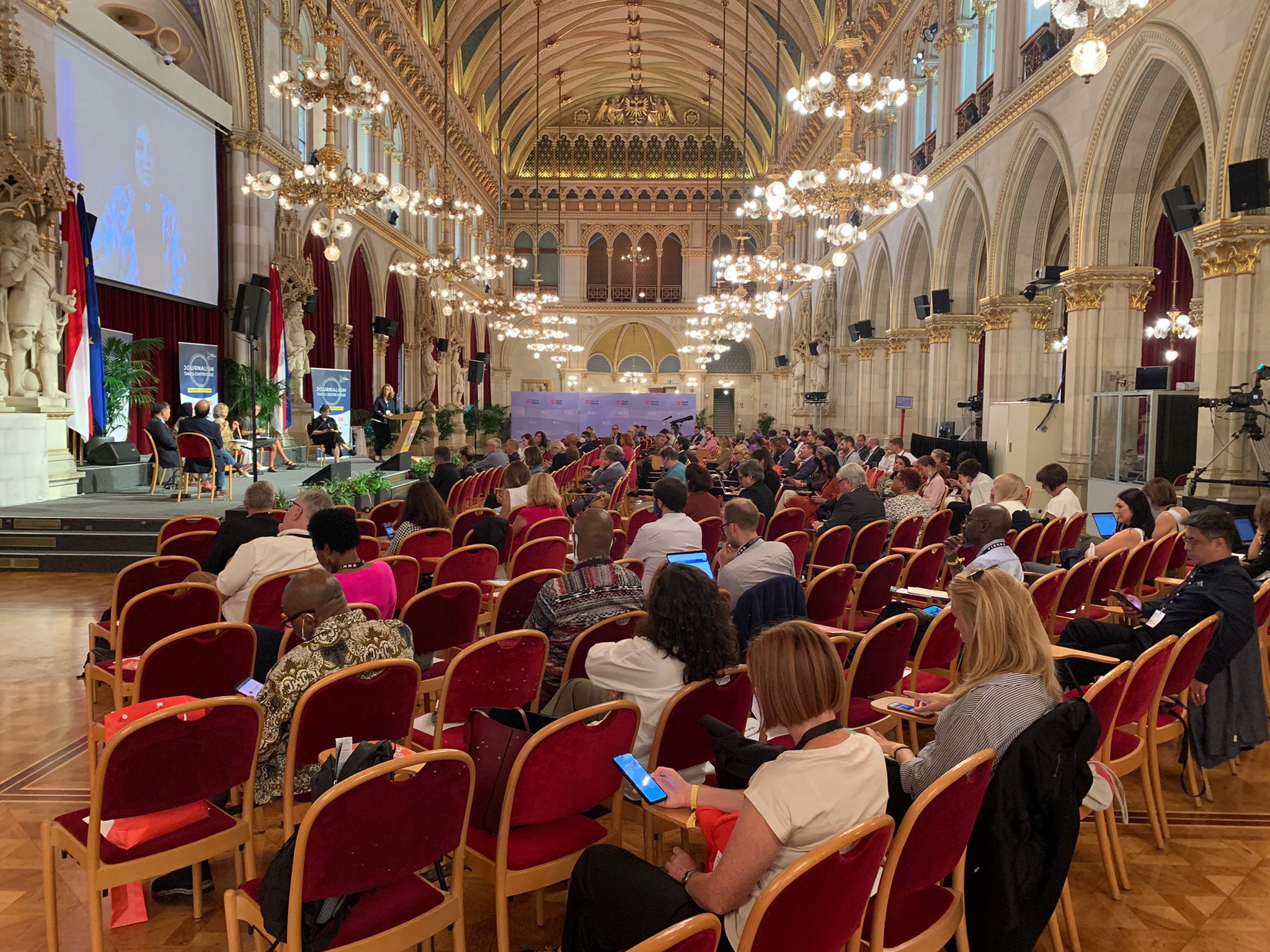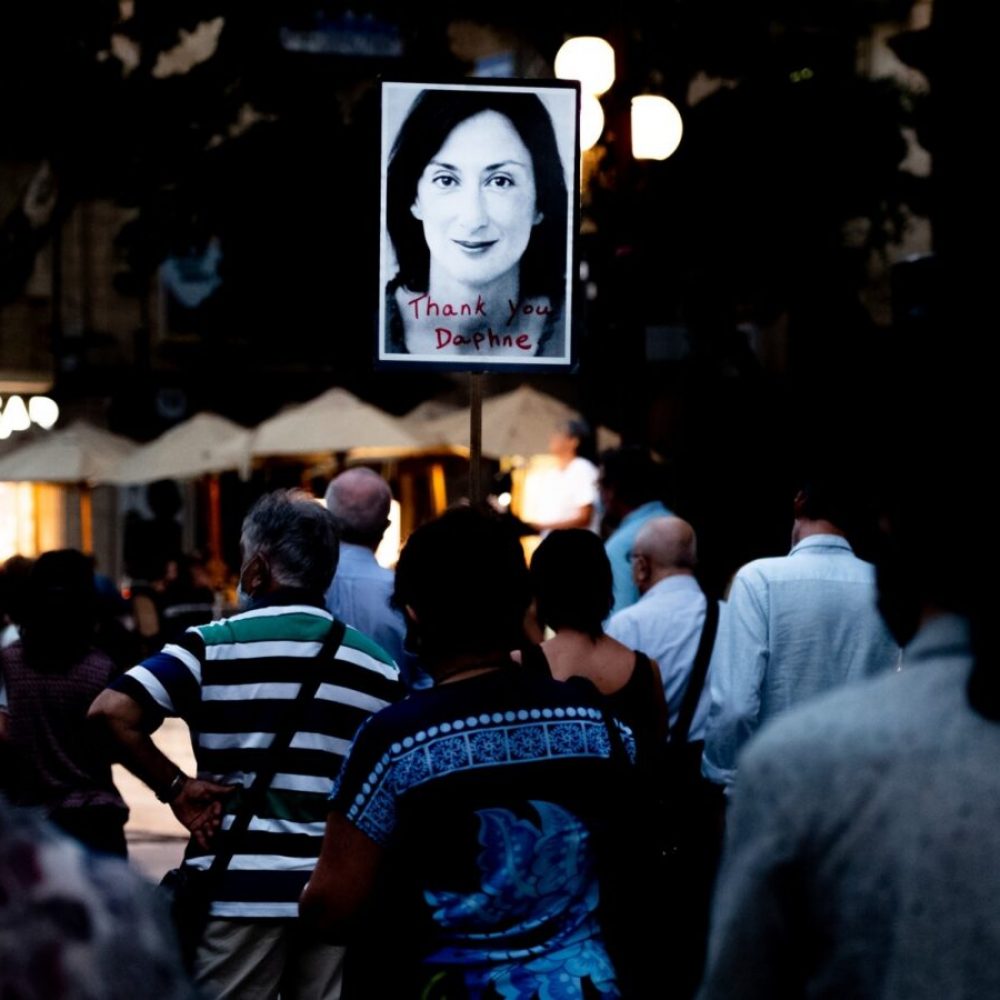“If we don’t fight for press freedom, who will?” This was the question posed by The Shift’s founder and editor Caroline Muscat at the International Press Institute’s World Congress last week.
Muscat was invited to Vienna to present The Shift’s investigation into the role of government-sponsored hate groups in the death of Maltese investigative journalist Daphne Caruana Galizia, as part of the masterclass in combating online harassment.
The six-month investigation into the Labour Party’s secret closed Facebook groups began when whistleblowers inside the groups approached The Shift with inside information. Months of data collection revealed the patterns behind systemic attacks against anti-corruption activists and journalists coordinated by these groups, which included top members of Malta’s governing Labour Party.
Government officials and public service employees – including at the justice ministry and the education ministry – actively administered and moderated the groups, “including screening members for Labour Party membership and curating content by removing critical views”.
Yet when it came to inflammatory language, and even hate speech, against activists, journalists and opposition MPs, the groups were unmoderated – such language was fuelled and even rewarded.
Their chief target was the journalist they saw as their most dangerous opponent: Daphne Caruana Galizia. The attacks became more frequent, more persistent, and more vicious in the years leading up to her death, particularly after her work on the Panama Papers, which exposed the secret offshore money laundering structures of Malta’s energy minister and Joseph Muscat’s chief of staff.
These groups celebrated her assassination and continued their dehumanisation campaign well after her death.
The inquiry board would eventually conclude that the slain journalist was the victim of an orchestrated dehumanisation campaign that was successful, they said, precisely “because it was centrally organised by the Prime Minister’s Office, and that eventually led to the complete isolation of a journalist when she also became the target of the then leader of the Opposition.”
The increased hostility Caruana Galizia faced is mentioned frequently in the report, which charts in meticulous detail the many instances of hostility she experienced throughout her life. The evidence of The Shift’s investigation presented to the board of inquiry helped seal the central verdict of the public inquiry – the State was responsible for her death.
The board concluded that Caruana Galizia’s isolation and dehumanisation, coupled with the inaction of law enforcement and other authorities, helped create an atmosphere of impunity in which those who wished to harm her felt they could do so with the assurance that they would be protected.
The targeting of journalists isn’t just a product of the polarised Maltese political scene.
One of the main speakers for the master class on online harassment, Kristin Olson, Principal Advisor at the Organization for Security and Co-operation in Europe (OCSE), said 73% of women journalists responding to a UNESCO survey reported online violence or threats of violence, with 25% reporting physical violence, including extreme cases that led to journalists struggling with symptoms of post-traumatic stress disorder.
“The aim of such disinformation campaigns and personal attacks is to silence reporters and their extended communities to harm their reputation,” she said, “which as you all know, is everything in our business.”
OSCE Representative for Media Freedom Teresa Ribeiro said one of the main issues faced by journalists across the world is a wave of public distrust fuelled by politicians who label dissenting outlets as fake news.
“The main problems we face is with enforcement; the kind of mechanisms we have to make states comply are very fragile,” she said. “We really need to push for international mechanisms to allow us to fully follow-up and implement the changes that are needed.”
Věra Jourová, European Commission Vice-President for Values and Transparency, referred to failures of law enforcement authorities in her speech addressing the World Congress in Vienna on the final day of the event.
“The justice system is being abused to silence journalists,” she said. “When Daphne Caruana Galizia was killed in Malta in 2017, she had 47 libel suits against her.”
“Media and freedom of speech are indispensable if we want democracy in the EU […] We have statistical figures showing that journalists have had more than 900 physical attacks during demonstrations, online, or on their property. Women journalists in particular are under permanent threat.”
Jourová closed with a stern warning: “This is our message to member states: do more to protect journalists.”
Initiatives are being put in place, thanks largely to the awareness brought to the risks facing journalists across the EU after the brutal murders of Caruana Galizia and of Slovak journalist Ján Kuciak, although the EU is being criticised for not doing enough.
The Dutch organisation PersVeilig (press safety) was founded by former war correspondent Peter ter Velde and Dutch police to deter attacks on journalists in the Netherlands. It has built a functional, effective partnership between the media and police, with protocols that include prioritisation of threats against journalists in the justice system, the guarantee of immediate follow-ups from law enforcement, and a ‘200% punishment’ clause which allows judges to double the sentence that would normally be imposed on an aggressor for any form of harassment against a journalist.
Christian Burger, Head of Community Management at the Austrian newspaper Der Standard, spoke of his outlet’s efforts to promote positive, constructive engagement on their highly-trafficked comments sections while weeding out bad actors to improve the overall quality of discussions.

The Shift’s Caroline Muscat told the IPI world congress that “the public inquiry concluded the state was responsible for Daphne’s assassination. The government must now implement the inquiry recommendations after such a ruling from three prominent judges.”
“We now have a tool which we can use to continue the fight for justice for a journalist killed – we are now in a position where we can act as watchdogs to ensure the judges’ recommendations are implemented, which would lead to an improvement for press freedom in the country,” she added.
She stressed that the results of the public inquiry are of global significance as “groundbreaking confirmation of the role political propaganda played in a journalist’s assassination”.
The recommendations go beyond the tiny island Member State, and adopting them would do much to protect journalists across the whole of the European Union.
The IPI’s masterclass in combating online harassment was held on 16 October, exactly 47 months after Daphne Caruana Galizia was killed.
European Commission President Ursula von der Leyen was in Malta that day to approve the government’s plan to access EU funds as part of its pandemic recovery package. Shortly after the press conference ended, she visited the site of Daphne’s death, along with members of the slain journalist’s family.
Posting on Twitter later that day, von der Leyen wrote, “Daphne Caruana Galizia made the ultimate sacrifice for democracy. Today, I honour her memory. We must protect those who speak truth to power”.
Robert Abela was conspicuously absent. No Maltese prime minister has paid a visit to the site, including the leader who ruled the country when Caruana Galizia was torn apart by a car bomb in a contract killing aimed at silencing her investigations into high-level government corruption.
The following project is weekly Maltese Roundups prepared by The Shift News (Malta) offering the latest news in the Daphne Caruana Galizia case.

